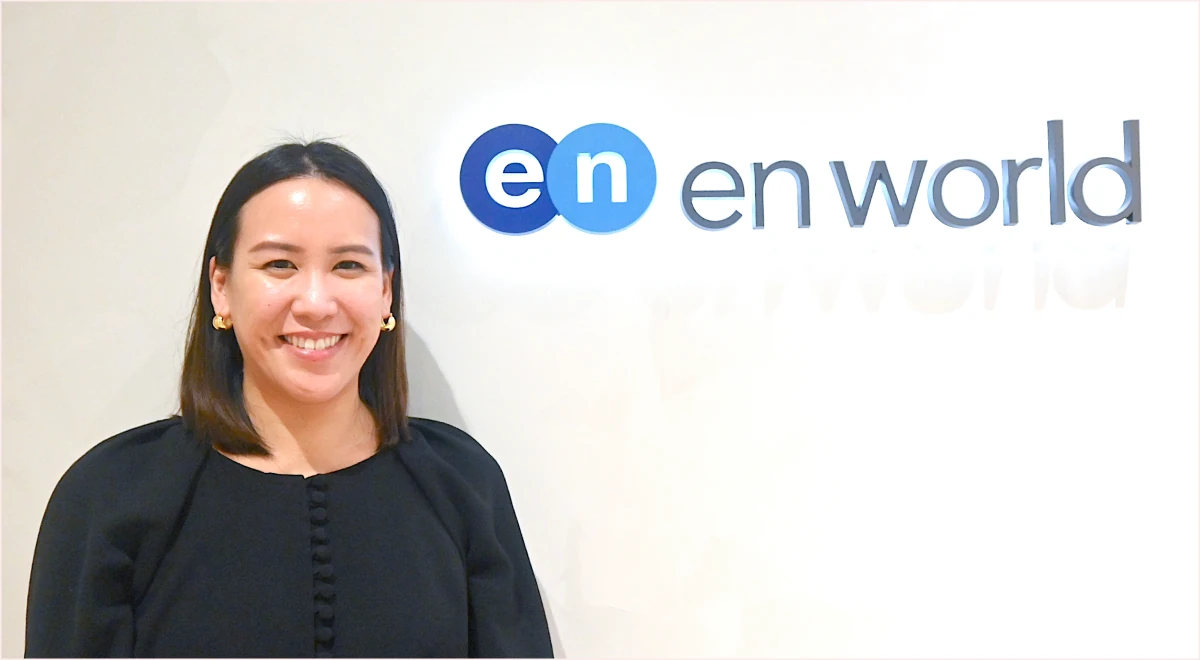Zipan Case Study
En World Japan Co., Ltd.
To facilitate smooth internal communication, we provide a Japanese language learning environment for foreign employees who wish to do so.

Since its establishment in 1999, En World Japan has been providing recruitment and temporary staffing services specializing in global human resources, as well as job change and recruiting support for executives, and Recruiting Process Outsourcing (RPO) services. The company, where approximately 30-40% of employees are non-Japanese, has introduced Zipan to provide opportunities for non-Japanese employees to study Japanese not only for grammar, reading comprehension, and basic conversation, but also to deepen their understanding of Japan's unique business customs, language usage, and Japanese culture.
Traditional issues
The benefits of improving the Japanese language skills of foreign employees
--Please tell us about your company's challenges and goals regarding the Japanese language skills of your foreign employees.
While Japanese language proficiency is not necessarily required for work, being able to converse in Japanese and understanding Japanese culture and business etiquette are important for strengthening teamwork within the company. Japanese people tend to respect the feelings and opinions of others, but are reserved when it comes to expressing their own opinions. On the other hand, foreign employees tend to express themselves directly, and we believe that improving Japanese language skills and understanding different cultures will help bridge this gap. Strengthening relationships with an eye toward business expansion is also an issue. Recently, the number of bilingual foreign employees has been increasing, and opportunities to use Japanese, such as when presenting to clients, are also on the rise.
-Please tell us the background behind your decision to provide Japanese language training to foreign employees.
Based on one of en world's core values, "Continuous Improvement: Finding areas for improvement in daily work," we have introduced Zipan as a professional program to support employee growth. We hope that this will help employees find areas for improvement in their daily work and lead to the development of excellent human resources.

Learning & Development Cherri Cathi
Selection Process
Flexible schedules and a wide variety of lessons are attractive
- Please tell us why you chose Zipan.
Before introducing Zipan, we were using the services of another school for Japanese language training. We were also reviewing our program when we introduced Bizmates' English conversation lessons, so we decided to adopt Zipan, which is offered by the same company, as it was more consistent and easier to use. The flexible schedule that allows employees to learn at their own pace and the wide variety of lesson programs were also key factors in our selection.
Implementation Plan
I want to give employees who raise their hands the opportunity to learn Japanese.
- Please tell us about Zipan 's implementation plan and target audience.
Zipan was introduced in March 2023. Each term is three months long, and participants can choose between five or ten 25-minute lessons per month. Applications are open to full-time and contract employees, with applications particularly coming from employees involved in IT-related work and the sales team. Participants range from those with a high level of Japanese to beginners, and the program is open to employees who raise their hands when the recruitment period begins.

Effects after implementation
Hopes for increased confidence and motivation in Japanese
-Please tell us about the results you gained from the training.
Although we have not yet conducted a survey, we have noticed an increase in situations where foreign employees are speaking Japanese with confidence and actively conversing with Japanese employees. It was also impressive to see them actively communicating in Japanese at the company Christmas party.
-Please tell us about the effects of the program and the support you provide to participants.
We set KPIs to ensure that Zipan students continue their studies. For example, if a student signs up for 10 lessons, we set a goal of at least 8 sessions. We have also heard of cases where what they learned at Zipan is directly related to Japanese culture and etiquette, and they are applying it to their work. Thankfully, more than half of the students continue to take the course, and the number of participants in our in-house language exchange events, the Language Table, has also increased. We can see that this has improved employees' motivation to learn Japanese.
Thank you for your time today. I wish you the best of luck in your future endeavors.
Employee's voice ①
Executive Search
Zohair Ahmed

-Please introduce yourself.
My name is Zohair and I am a manager in the Executive Search Team at en world Japan. I have lived in Japan for five years and joined en world two years ago. I spent my university years in Hong Kong and studied Chinese, so I can read a little kanji. Before coming to Japan, I also worked in Hong Kong and Thailand.
-Are there any difficulties you face working in Japan?
I don't have many opportunities to write Japanese at work, but I find writing in kanji and other characters difficult. Japanese business culture also has a conservative side, placing great importance on rules and discipline. While this culture has its wonderful aspects, it can also make it difficult to build trust. I value the time I spend speaking in Japanese with friends, colleagues, and superiors, and I try to ease any stiff atmosphere with methods like handshakes. Learning Japanese is also one way to build trust with clients. While specific work is done in English, even if I use a little Japanese, it helps break the ice and close the gap between us.
-What Japanese manners and customs did you not know or were surprised by?
I once attended a client meeting with my boss, and the tie I was wearing was silver. I was surprised to learn later that in Japan, silver ties are worn at weddings. I feel there is still a lot I don't know about these unique Japanese manners and customs.
-Please tell us about your teaching style.
I use Assist Lessons (freestyle) and "NIHONGO FUN & EASY" as my teaching material. I have taken the course over 140 times so far. My Japanese level has improved from Zipan Program Starter - Rank. A to Rank. C. I take the course once or twice a week, either after lunch or after work.
-Please tell us your thoughts about the Zipan lessons you took.
Before taking Zipan, I had no opportunity to learn Japanese at all. Now, Zipan 's 25-minute lessons are not enough, and I find them so enjoyable that I want to take them back-to-back. I mainly receive Japanese language instruction from two trainers, both of whom are kind and wonderful, and are flexible with their schedules. I chose "NIHONGO FUN & EASY" because a Zipan trainer recommended it to me as something that would help improve my Japanese communication. This material focuses on speaking, and is very easy to understand, as it is written in romaji with hiragana pronunciation. The Starter lessons focus on business phrases, and I find it appealing that I can learn different topics from "FUN & EASY."
-Please tell us about the effects of the lessons and what you felt.
I now have more opportunities to go out to eat with clients, as well as Japanese colleagues. This makes me very happy. Although I often converse in English, my clients appreciate it when I order in Japanese. In lessons, private topics are also discussed, and the trainers give precise advice, so I feel my everyday conversation skills are improving. I'm grateful that I can learn the necessary content based on real-life situations. Japanese is a very beautiful language. My goal in life is to work and live in Japan. To achieve this, I believe it's important to thoroughly study Japanese.
Employee's voice②
Contract Professionals HR SCM & Life Sciences
Mr. Faiz Satyandanur

-Please introduce yourself.
My name is Faiz and I'm from Indonesia. I joined en world Japan as a new graduate and this is my fourth year here. I work in a sales department that mainly handles non-permanent employment cases, such as supporting contract and temporary employees looking to change jobs and introducing personnel to companies. I really enjoy talking to people of various nationalities and introducing them to jobs, and that's what makes my job rewarding.
-Are there any difficulties you face working in Japan?
To be honest, everything is difficult. In Japan, there are unique business practices, such as how to speak, use honorific language, how to write emails, and how to deal with customers. Indonesia has a more casual culture, so I feel that there are big differences there. What I struggled with the most was writing emails. When I first joined the company as a new graduate, many of my classmates were mid-career hires, so they already knew how to write business emails. However, I didn't know how to write emails to customers, and I didn't even know typical expressions like "Thank you for your support."
-Please tell us about your teaching style.
I started taking Zipan courses about two years ago. I started because I thought it would be useful for my work, and I'm still taking courses to this day, having taken over 90 lessons so far. My Japanese level has improved from Zipan Program Level 2 – Rank. A to Zipan Program Level 3 – Rank. C, and I've also taken Other Programs to learn email and telephone skills.

-Please tell us your thoughts about the Zipan lessons you took.
The content of Zipan 's lessons matches my work and life. That's because, although I chose Japanese language classes at university, the content was general and not business-oriented. Also, when I studied at an online Japanese language school during my first year as a working adult, the focus was on free talk and opinion exchanges, such as presenting news and social situations in Japanese, which made it a little difficult to apply to actual work.
On the other hand, Zipan 's format allows you to speak directly with a trainer one-on-one, and I find the convenience of each lesson, which is only 25 minutes, appealing. In particular, the lessons on how to write business emails and how to respond on the phone are directly relevant to my work and have been very helpful. I also like the fact that I can check the textbook in advance and choose what I want to study the next day. It's also helpful that instead of being taught one-sidedly, the trainer asks me, "How have you been writing up until now, Faiz?" and asks me about my previous methods and gives me specific suggestions for improvement.
I don't need to memorize the entire contents of the textbook, and I appreciate the flexibility of being told, "This phrase is sufficient." I also learned Japanese-specific business vocabulary, such as "horensou (report, contact, consultation)," through Zipan. At first, I took lessons from a variety of trainers, but now I've narrowed it down to one trainer who really understands my Japanese level and my weak areas. Even in the short time we spend together, I enjoy small talk about recent events, and the lessons are fulfilling.
-Please tell us about the effects of the lessons and what you felt.
When I first joined the company, there were many Japanese customers who could speak English, so 80% of our conversations were in English. However, now 80% of our interactions are in Japanese, which I think is a big change, and learning business Japanese has given me confidence. Last year, I passed Level 1 of the Japanese Language Proficiency Test (JLPT). I studied using mock exams for about a month, but my regular Japanese studies are limited to self-study and Zipan. I have more opportunities to use Japanese at work and in my daily life, and I can really feel my growth.






